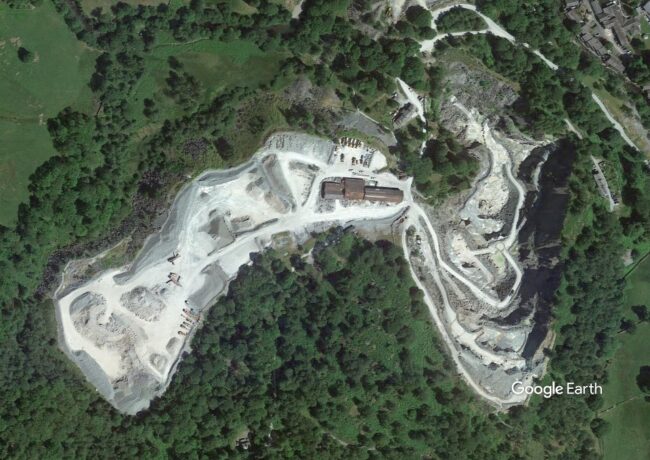Gove outlines long-term plan for housing; industry reacts
While the promotion of Barrow-in-Furness was welcomed, property professionals remained sceptical that secretary of state Michael Gove’s speech would prove to be more than just, well, words.
Gove unveiled on Monday the government’s strategy for completing its manifesto pledge of delivering 1m homes by the end of this Parliament. The plan includes a series of actions directly aimed at unlocking homes in Leeds, Cambridge, and London.
Gove also put the spotlight on Barrow-in-Furness.
“We want Barrow to be a new powerhouse for the North – extending beyond its current boundaries with thousands of new homes and space for new businesses to benefit from the scientific and technical expertise already clustered there,” Gove said, adding that the cabinet secretary would be in Barrow-in-Furness later this week to meet with local leaders to plot a strategy for the community.
Alongside those area-specific plans, Gove’s speech included a variety of national reforms. These include:
- increasing planning fees to better fund local authority planning departments
- creating a £13.5m team of planners and experts to supercharge housing delivery in investment zones
- establishing a £24m Planning Skills Delivery Fund to support local authority planning teams
- starting a consultation on proposed permitted development rights that would make conversions of offices and stores into homes easier
- launching the Office for Place, which will be dedicated to supporting high-quality design in housing
- reiterating the government’s commitment to making second staircases mandatory in new residential buildings that are at least 18-metres tall
Read the full transcript of Gove’s speech
What does the industry think?
When asked her thoughts on the speech, Melissa Wilson, director at Deloitte, started out optimistic.
“It is positive to see recognition of the role cities and urban centres play in delivering the housing ambition, especially given the scale of delivery achieved over the past 10 years in Manchester and Salford city centres,” she said.
And then she added some caveats.
“The quality of the urban environment and delivery of key infrastructure will be critical to creating successful places,” Wilson continued.
“There are no quick fixes, especially in regional markets, and key part of the solution will be better working models with private sector partners and investors.”
She also noted that there was no mention of sustainability or net zero in the government’s plan.
“This needs to be addressed as investment and delivery will be constrained unless government supports that agenda and the challenges it presents to delivery at scale and at pace,” she concluded.
Paul Nellist, associate partner at Asteer Planning, was worried about the focus on cities and what the speech meant for housing targets.
“Following Gove’s speech, the government’s previous watering down of ‘housing targets’ to appease rebel MPs, looks more likely to become national policy,” Nellist said.
“Those targets already included a 35% uplift for cities (including Manchester, Liverpool, and Leeds), and the rapid regeneration of these cities, would suggest that a lot of people clearly want to live there.
“However, the implication that people should not want to live in other areas is simply wrong,” he continued.
“Whilst it may help win votes, the approach outlined will do nothing to deliver enough housing, in particularly family and affordable, throughout most of the North West.”
Thomas O’Kane, associate at P4 Planning, was similarly unimpressed by Gove’s words, calling it the “same old rhetoric”.
“Tackling the housing crisis requires action on all fronts,” he continued, identifying the need for support for SME housebuilders, updating of local plans, clarification of housing targets, review of the Green Belt – as well as the speech’s proposed major investment in urban regeneration.
“Successive governments have put forward regeneration of cities and that obviously needs to come forward, but unfortunately it won’t be enough to address our housing needs,” he concluded.
Caroline Baker, managing partner of the North West at Cushman & Wakefield echoed O’Kane’s concern that this would not be enough to truly meet the challenges facing housing delivery – especially when it came to government’s proposed planning changes to encourage residential conversions.
“The ability to convert existing buildings into new homes does not require changes to the planning system it requires, in many cases, more grant funding to overcome viability issues, especially following significant increases in development and finance costs,” she said.
However, she was optimistic about other elements of the speech.
“Overall I welcome Gove’s commitment and new initiatives to support the densification of our towns and cities through the delivery of more safe, decent, and warm homes,” she said.
Thomas Pearson, head of real estate commercial at JMW Solicitors, also picked up on the conversion portion of the speech. Previous changes to planning regarding office-to-residential conversions had been met with approval by Pearson’s clients.
“Those eager to see permitted development changes expand will welcome this,” Pearson said. “What can actually be delivered in these units remains to be seen.”
He was particularly interested in the conversion of retail spaces to homes.
“With the impact on retail in recent years there is more vacant space and rejuvenation of this space into alternative uses will hopefully revive these areas,” Pearson said.
“But it is worth noting a word of caution – as following past consultation on this in early 2021, BPF said the proposal would have significant adverse consequences and exacerbate the decline of the UK’s high streets, far outweighing any positive contribution to new housing supply”,” he concluded.
Sandy Livingstone, executive director of property at Onward Homes, was much more optimistic in his feedback than others Place spoke to.
“We are pleased to see the government recognising the value of regeneration and investing in brownfield land, to improve the quality and choice of housing for all,” he said. “Offering renewal and opportunity to our communities will be key to driving economic growth at both a local and national level.
“It is important, however, that any extension of permitted development regulations does not detract from our larger-scale placemaking ambitions,” he continued.
“I look forward to more of our great Northern cities like Preston, Liverpool, and areas of Greater Manchester benefitting from much-needed investment over the coming years.”
Zeroing in on Barrow-in-Furness
Jo Lappin, chief executive of Cumbria LEP, said she welcomed Gove’s commitment to Barrow-in-Furness. Barrow-in-Furness, she pointed out, is Cumbria’s second-largest town and is already a hub for the defence, advanced manufacturing, and clean energy industries.
“All of the component parts are in place to provide a platform for significant growth, including a new learning quarter and a commitment to build much-needed new homes on the waterside site,” Lappin said.
“It will also create the opportunity to transform the whole area and address unemployment, transport connectivity, skills gaps, low-quality housing, and health issues. Barrow will need significant, sustained investment to turn this ambition into a reality.”
Cllr Patricia Bell, deputy leader of Westmorland and Furness Council, spoke about why these new homes are needed in Barrow-in-Furness.
“Barrow is a global leader in a number of high-tech sectors including subsea and green energy through BAE Systems Ltd, innovative SMEs, and an established supply chain,” she said. “This is going to result in the creation of thousands of new, well-paid jobs in the coming decades, particularly through BAE System’s involvement in Aukus.”
Bell also shared her support for the government’s decision to prioritise her area.
“With strategic housing sites already identified in the area, we welcome yesterday’s announcement that will help to bring forward the range of new homes needed to help attract people and families to Barrow, ensuring that the area can fully benefit from the significant opportunities coming forward in the future,” she said.
“We look forward to welcoming cabinet secretary, Simon Case, later this week to scope out areas for significant further expansion and investment.”
Sebastian Tibenham, executive director of Pegasus Group, agreed that Barrow-in-Furness was loaded with potential – but noted that it could also be an example of failed government ambition.
“Barrow is undoubtably a location that should incorporate additional housing into its overall strategy for regeneration and investment,” Tibenham said.
“Looking back, Barrow was afforded certain ‘urban renaissance’ kudos in the revoked NW Regional Spatial Strategy and tasked with delivering 2,700 new homes by 2021,” he continued.
“Fast forward to the government’s standard method for calculating local housing needs, Barrow is afforded a negative/zero housing requirement and census figures showed the town grew by 35 households between 2011-2021.
“Fingers crossed, Gove’s plans will now spearhead its previously planned regeneration trajectory as set by the RSS a number of decades ago.”
What about that dream team?
Gove’s formation of a “super-squad” team of planners and other experts was one of the more interesting aspects of the speech. The team is being “deployed” in Cambridge first and it will be there that the team’s effectiveness will be measured.
Tibenham was cautiously optimistic about the creation of the team.
“The government are putting in resources to ensure major schemes involving housing deliver get the attention they deserve,” he said. “This sounds great but I’m not getting too excited in terms of the benefits of the North West at this stage because other areas don’t appear to get a look in until Cambridge has sorted itself out.”
But if Cambridge does sort itself out, there could be larger benefit to the North West, according to Cushman & Wakefield’s Baker. The Cambridge housing push is all about providing good homes for those working in life sciences – a sector that the North West is looking to grow in as well.
This could mean more consideration is due for the region by the government.
“Our North West Life Science Cluster along the Manchester Corridor and in North Cheshire could support and complement the government’s commitment to supercharging Cambridge in the global hierarchy,” she said.
“The North West can offer both more affordable lab space as well as a more affordable location for workers.”





Not really a long term plan when they’ll be out of government in a year
By Anonymous
Gove is a rarity in Sunak’s clueless cabinet. He actually does have ideas.
By Elephant
There are huge areas of underused wasteland in Birkenhead, Liverpool, Warrington and Manchester which should provide desperately needed high quality housing. The government should focus housing in these urban areas with support from and expanded trams/Merseyrail/bus system to enable people to have access to safe and reliable public transport.
By GetItBuilt!
Inspite of one very small nugget, a focus on towns and city’s . But overall totally inadequate, a commitment to 30k social housing when 30k being sold or demolished is meaningless. Not having targets for local authorities means housing numbers will fall . Decision not to apply decent home’s standards and the slowing of sustainable standards on the private sector mean poorer homes ( the number of conservative mps who are private landlords should be forbidden to vote on these issues cos of conflict of interest. ) reduced control on redevelopment on existing homes has dangers . Especially in areas of terraced homes . Overall score 1 out of 10
By George
Liverpool, like other big cities,has many main arterial roads lined with empty shops which would be ideal for being converted into attractive flats and maisonettes.
This would maintain the atmosphere along these roads, like Glasgow has done in upgrading the classic tenements throughout that city.
By Anonymous
If land remediation costs were paid by the Government purse – to ensure all local requirements are met for affordable housing, recreation, offsetting nitrate/recreational pressure issues etc – this may unlock a whole load of sites, which would be more worthwhile funding than what is proposed here.
Worked for SRB/HMRI schemes …
By JohnMac
Move along, recyled unworkable Government election promises, nothing to see here!
By Anonymous
Agree wholeheartedly with Paul Nellist’s analysis above….without targets local councillors will simply be forced by their constituents to abandon plans and housing numbers.
By Sceptic
Yes to that @Elephant
Probably in my view one of the genuine political thinkers of the last decade or so. A rare bird.
By SW
A masterclass of rubbish. Everyone into the cities, no focus on family and affordable housing – simply a way to reinforce the protective stance for his NIMBY backbenchers. The sooner this idiot and the rest of his tarnished cabinet are out of office the better. They have ruined housebuilding strategy in this country – so why not put up planning fees again, for developers and housebuilders to wallow through an even more glacial process.
By Anonymous
Hoping the long term plan includes lots of 50+ storey buildings everywhere
By Giant Skyscraper Fan
So depressing from the only Cabinet Minister with the capacity to think strategically – says everything about the Conservative Party and their need to try and protect their core electoral vote. Having said that would a Labour Government be capable of giving England a long term plan to deliver the homes we need – if they can reform the politicised decision making in planning at a local level then there might be a chance.
By Anonymous
Agree with JohnMac’s comment on land remuneration being paid for centrally, this genuinely would unlock a significant amount of sites which otherwise would not be viable / attractive to developers.
By Bradford